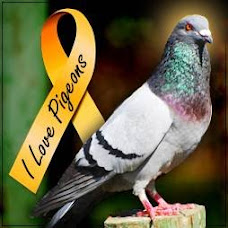Dr. Anthony A. Pilny, DVM, Dipl ABVP (Avian):
The frequency of disease transmission from birds to humans is very LOW, but the young, the elderly, and those with compromised immune systems should be cautious as bird to human disease transmission is known to occur. Many of these diseases are transmitted by ingestion of food contaminated by fecal matter. Prevention of most of these diseases, therefore, simply involves proper hygiene and sanitation, and common sense. Contact with pigeon droppings may pose a SMALL health risk. The Centers for Disease Control and Prevention lists three human diseases known to be associated with birds (including pet birds such a parrots) and associated with pigeons/droppings: histoplasmosis, cryptococcosis, and psittacosis.
The FACTS:
Psittacosis - Since 1996, fewer than 50 confirmed cases were reported in the United States annually. In New York City, psittacosis is VERY RARE with less than ONE human case identified each year. According to the CDC, about 70% of infected people had contact with infected pet birds – not pigeons.
Cryptococcosis - Approximately 0.4-1.3 cases per 100,000 people in the general population are reported. It is very unlikely that healthy people will become infected even at high levels of exposure.
Histoplasmosis – An incidence is not reported so it is assumed to be low. Once again immunocompromised individuals are at greater risk and those in third world countries.
As one can see – risk of contracting disease from pigeons in NYC is very low and has not been proven to pose any public health threat. Diagnostic screening (medical testing) of the pigeon population in NYC for the few zoonotic diseases that exist has not been performed and would definitely shed light on the true incidence and risk. Routine cleaning of droppings (e.g. from windowsills) does NOT pose a serious health risk to most people. Some simple precautions can be taken to further reduce direct contact with droppings, such as wearing disposable gloves and clothes that can be washed after exposure.
As far as I know – NYC hospitals are not inundated with patients sick from living in an environment with pigeons. As an avian veterinarian who sees and treats pigeons, I believe there is little risk to myself and staff from working with these birds. I don’t have fear of becoming ill by walking around and visiting the parks, or just living here in NYC with our wonderful pigeons.
References:
http://www.cdc.gov/
http://www.nyc.gov/
http://www.abolishpestcontrol.com/articles/pigeondisease.pdf
Anthony A. Pilny, DVM, Dipl ABVP (Avian)
http://www.avianexoticpetvet.com/
New York City Health Department:
Despite their reputation as disease carriers, the city Health Department does not consider pigeons a major danger and says the average New Yorker is not at risk of catching anything from the birds or their droppings.
Source: ABC News, New York, NY
Manhattan Albert Einstein College of Medicine:
Dr. Arturo Casadevall (one of the world's foremost experts in pigeon poop)
Director of Division of Infectious Diseases
Manhattan Albert Einstein College of Medicine
Picking on pigeons is unwarranted, Casadevall warns. "Pigeons are no different than other animals. When it comes to spreading disease, they don’t stand out. Dogs can have worms; bats, rabies; cats, toxoplasmosis . . . We’re exposed to microbes everywhere. You can get diseases from any animal, even a cockatoo. To single out pigeons is unfair.”
Gulf News.com
The following are quotes from credible experts with the REAL FACTS about pigeons and public health: -
TV series segment, Healthier Living, shows how feeding wild pigeons helps relieve the stresses of day to day living.
"...diseases associated with [pigeons] present little risk to people..."
Dr. Michael McNeil, Centers for Disease Control (CDC) in Atlanta.
"One man's nuisance is another man's pleasure." "'People worry that pigeons carry disease,' but the danger is 'an exaggeration created by pest control companies looking for business.'" -
Guy Hodge, Naturalist for the Humane Society of the United States.
"The New York City Department of Health has no documented cases of communicable disease transmitted from pigeons to humans." -
Dr. Manuel Vargas, New York City Department of Health.
"Pigeons are not a public health hazard. Nobody in public health is losing any sleep over pigeons." -
Dr. Joel McCullough, Medical Director, Environmental Health, Chicago Department of Public Health.
"[...the Arizona Department of Health Services does] not have any documented human cases of disease which have been definitively linked to outdoor pigeons or pigeon droppings. When cases of diseases are reported (and by law [certain bird related zoonoses are] reportable diseases), VBZD staff conduct complete investigations to confirm the diagnosis and identify the source of infection. …Our case investigation data gathered so far, would suggest that pigeons are not significant as a cause of human disease in Arizona."
“We don’t see pigeon-related-disease problems...” “I don’t think they’re seeing them anywhere..." -
Bill Kottkamp, Supervisor, Vector Control, St. Louis County Health Department
"Pigeons do not get avian influenza and don't carry the virus."
Dr. Cornelius Kiley, DVM, Canadian Food Inspection Agency
Although pigeons have been shown to become infected with West Nile Virus, they do not act as reservoirs and therefore don't transmit the virus..." -
Pennsylvania West Nile Virus Surveillance Program.
As a result, pigeons are generally no longer accepted for West Nile Virus testing by other government disease-surveillance agencies in the U.S and elsewhere.
“We do have some concern about the indiscriminate killing of pigeons.” “[For example, histoplasmosis disease rates are] misleading and irrelevant, because histo’s so ubiquitous. It’s in the soil, regardless of whether pigeons are around or not...”-
Dr. Marshall Lyon, National Center for Infectious Diseases, Centers for Disease Control and Prevention (CDC) in Atlanta
“Problematic density [affecting human safety] is probably more determined by people getting their possessions defaced.” “I’m not terribly worried about pigeons.” -
Dr. Alex Bermudez, University of Missouri-Columbia College of Veterinary Medicine
"I am not aware of any reported cases of diseases that were transmitted by pigeons in Mohave County." -
Larry Webert, R.S., Mohave County Environmental Health Division
"Pigeons aren't a big worry" -
Rex Sohn, wildlife disease specialist at the U.S. Geological Survey's National Wildlife Health Center in Madison, Wis.
Subscribe to:
Post Comments (Atom)












1 comment:
I found some information about histoplasmosis. Check it out!
Post a Comment